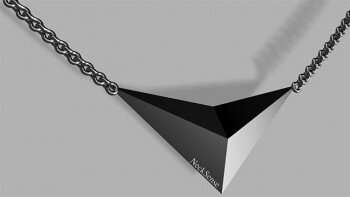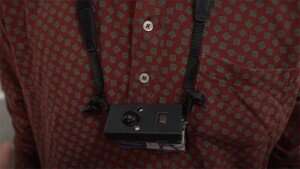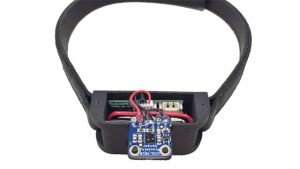Smart necklace will know you binged on Chunky Monkey

There you are wrist deep into a quart of Ben & Jerry's Chunky Monkey, digging ever deeper. You can't deny it. Your necklace is recording the ice-cream binge, which it will later dispatch to a coach or dietician.
The aim is not to induce guilt but rather answer the question: "How did you get here?"
Meet NeckSense, the first technology to precisely and passively record multiple eating behaviors. It can detect in the real world when people
are eating, including how fast they chew, how many bites they take and how many times their hands head to their mouths. This data—along with other information like heart rate—will help scientists understand what leads to binging or troublesome eating behaviors and how to intervene to stop those behaviors in real time.
A new Northwestern Medicine study with 20 participants validated the technology and was recently published in the Proceedings of the ACM on Interactive, Mobile, Wearable and Ubiquitous Technologies.
The technology currently includes wearing a tiny camera pendant to validate what the necklace is sensing. Eventually the camera will be removed. The next step will be a National Institutes of Health-funded trial to test NeckSense along with several other wearable devices with 60 participants who have obesity and validate the device against standard 24-hour recall.

"The arsenal of the dietician has been upgraded," said lead study author Nabil Alshurafa, an assistant professor of preventive medicine at Northwestern University Feinberg School of Medicine. "The ability to easily record dietary intake patterns allows dieticians—or even laypeople making use of our tech—to deliver timely digital interventions that occur as eating is happening to prevent overeating."
Currently, dieticians must rely on self-reporting based on 24-hour recall by the patient, a notoriously unreliable method because people forget what they ate or fabricate their diet, Alshurafa said. Another method, journaling food/drink consumption as it occurs, is subject to error because it is burdensome and disruptive to day-to-day routine.
"The beauty of this is that it requires almost no effort on the part of the wearer," he said.
Measuring people's eating patterns allows scientists to begin to understand how these variables are associated with overeating, providing them with new ways to intervene.
"Since overeating at night is common in many people, if we find someone has not been eating throughout the day, we may remind them to eat to prevent overeating at the end of the day," Alshurafa said. "Or we may detect someone is eating too fast and design methods to help them become more mindful when they're eating. A greater understanding of eating habits leads to a greater ability to modify them."

Eventually other sensors will measure heart rate and heart rate variability, emotional arousal detected from sweat, physical activity and location traces to see if an overeating behavior can be caught before it begins. If a person is stressed and their heart rate shoots up, their chances of overeating may increase if they walk past their favorite ice cream shop.
"If you are stress eater, I can detect that from my sensors without you telling me anything," Alshurafa said.
Most prior research has focused on validating wearable devices in controlled lab settings.
"This is why the majority of them fail in maintaining their performance in real-world settings," Alshurafa said. "We validated this device using a wearable video camera in a free-living setting, where people wore the device for two weeks. This allowed us to provide visual confirmation of people's eating behavior and meals/snacks in real-world settings."
The data also will include self-reported physical details such as and how hungry or satiated you feel or psychological details such as how depressed or how anxious you are. The user also will upload photos of their food via a smartphone app.
Next, Alshurafa and colleagues will tweak the necklace to make it more fashionable and test the feasibility of real-time interventions.
"What I envision is a future in which someone comes into a dietician's or physician's office, then gets these sensors," he said. "We determine their problems and design a customized intervention based on real data. Now we can really tell what their problem is and our solution is really tailored to them and their needs."
NeckSense is part of a broader study called SenseWhy, which will assess if wearing sensors will help us understand people's problematic eating behaviors in real time.
The title of the paper is "NeckSense: A Multi-Sensor Necklace for Detecting Eating Activities in Free-Living Conditions."
More information: Shibo Zhang et al. NeckSense: A Multi-Sensor Necklace for Detecting Eating Activities in Free-Living Conditions, Proceedings of the ACM on Interactive, Mobile, Wearable and Ubiquitous Technologies (2020). DOI: 10.1145/3397313















